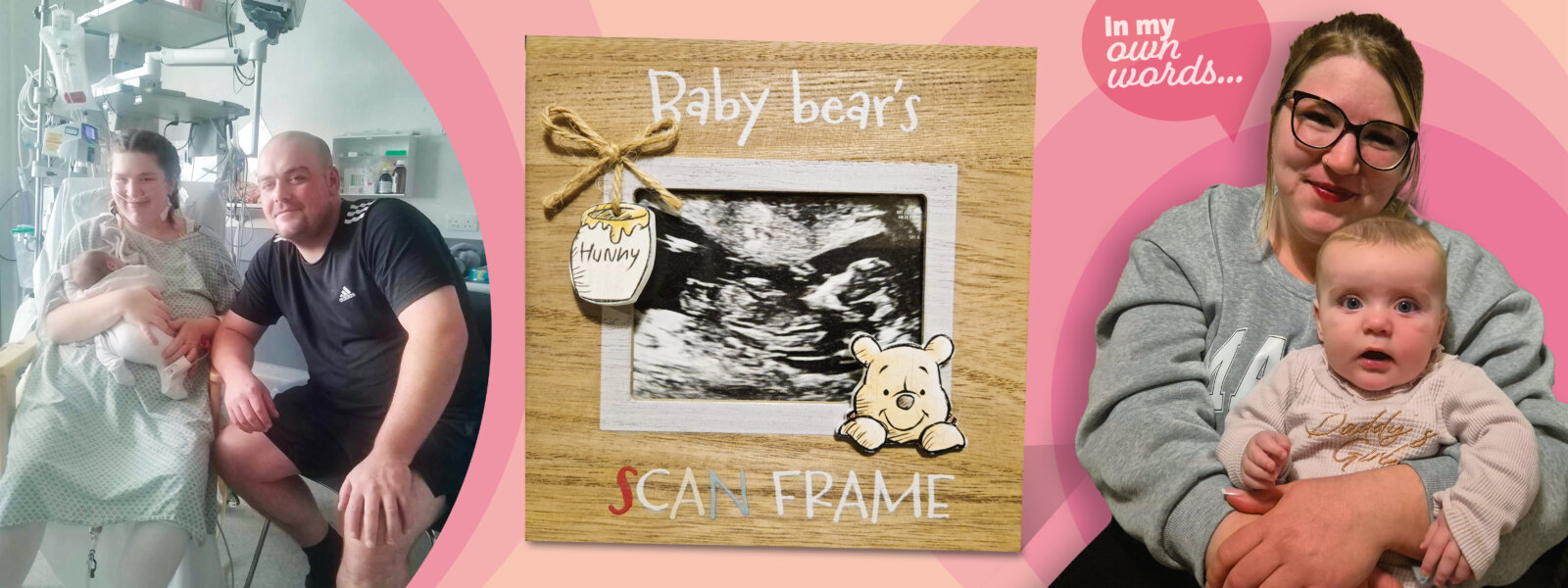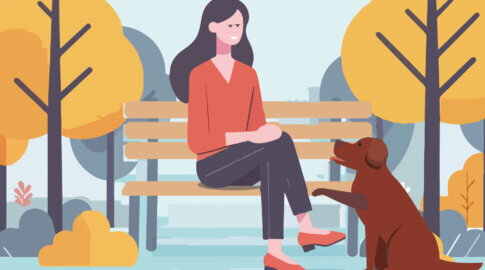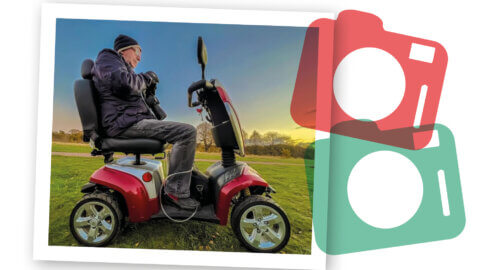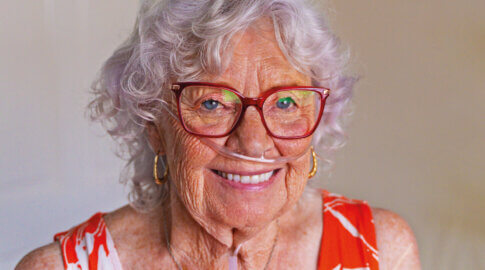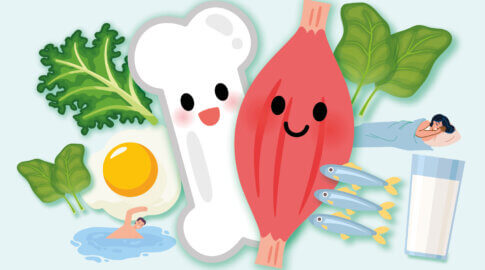“Giving birth saved my life”
Last year, Bethany Boyden entered hospital to have a baby and left with a PAH diagnosis and a Hickman line. Her story is unique, and she is sharing it here to help others feel less alone…
Story shared in 2025
“I was healthy before conceiving, working long and active shifts as a healthcare assistant and going to the gym, and until the last stages of my pregnancy I had no symptoms to suggest anything might be wrong.
From around 34 weeks, I started to feel light-headed. Three weeks before Elsie-Lucille was born I could just feel that something wasn’t right, but the GP told me everything was fine. I couldn’t make the ten-minute walk to the local shop without stopping, but I was told it was just part of pregnancy. This was my first, so I had nothing to compare things to.
I had a natural birth at my local hospital in Grimsby, a day before the due date. The labour was fine, and everything went well. I was preparing to take Elsie-Lucille home 24 hours later, and whilst my partner took my case to the car, the nurse took my blood pressure one last time. I remember her saying ‘I don’t like those numbers’ – and they decided to keep me in for a few more hours. I didn’t think anything of it.
My oxygen was checked, and that triggered a scan they couldn’t do whilst I was pregnant. I was told to call my partner back to look after Else-Lucille, and that’s when I knew something was really wrong. My mum died of a pulmonary embolism, so we thought it might be a clot.
A group of doctors came into the room, and I was told I was being taken to the high dependency unit – without my baby. It was a whirlwind and as they took me away, I wondered if I would ever hold her again. I thought that was it.
A day later, I was transferred to the specialist PH centre in Sheffield for further tests, so I was now two hours away from my three-day-old newborn. I’d have night terrors and rip my oxygen off, thinking she was crying and I couldn’t get to her (even though she wasn’t there) but the kindness of the nurses made such a difference. I was hooked up to all sorts of monitors and I was begging them to tell me if I would die, but it wasn’t something they could answer.
I think the enormity of the whole situation hit me all at once
When I was told I had pulmonary arterial hypertension after the right heart catheter test, I had no idea what it was. It destroyed me to find out it was incurable. Elsie-Lucille was just four days old: a little doll.
I stayed in hospital and was put onto intravenous therapy when Elsie-Lucille was three weeks old. That was huge to deal with on top of everything else. When I came back from theatre after having my Hickman line fitted, the specialist came up to me. All she said was ‘are you alright?’ but it was with such a soft tone that I just bellowed and crumbled into her arms. I think the enormity of the whole situation hit me all at once. I’d gone into hospital to have a baby and within four days I was being diagnosed with an incurable condition – and then having a line put into my chest.
As well as having to stay in hospital to be trained on the medication, I also contracted COVID-19 – so I was in Sheffield for over a month, whilst Elsie-Lucille was at home. It was such a long time to be away from her.
Despite being so pleased to be back with her, the first night at home after being discharged was incredibly hard. Elsie-Lucille was five weeks old and I was sitting there with a newborn baby, my Hickman line, and all the medication, wondering how the hell I was going to cope. How was I going to be strong enough to be her mum as well as administer my own medication and do my own dressings? How was I going to be able to do night feeds? Would I be enough for her? There was so much going through my head.
I knew I couldn’t give up, and I’ve adapted to this new way of life
I was struggling with air bubbles in the medication, with the medication cassettes, and with the deliveries of the medication too. I’d barely had to take paracetamol for a headache before all of this.
But I knew I couldn’t give up, and I’ve adapted to this new way of life. Elsie-Lucille gives me my strength. If I had been diagnosed without a baby, perhaps my mindset would have been different. But she needed me, and I needed her.
The timings around my IV medication were really challenging at first because I had to stick to the ones I’d been on in hospital – where I had nothing else to juggle. Back home, I had to work around a newborn, a partner, baby groups, and everything else.
My partner is a truck driver, so when he was out working, there was no-one to look after Elsie-Lucille whilst I sorted my medication. For the first three months I tried to time it in-between her feeds, but because everything has to be so sterile, I couldn’t touch her if she cried whilst I was sorting it, or if she needed her nappy changing. It would take me up to 45 minutes, and on bad days I got through multiple gloves, dressings and cassettes.
Now though, I’ve managed to change the time I do it each day so that someone can be there with her. As a mum, that was a hard pill to swallow though because I wanted to do it all without having to have someone there. I’m quite a loner and I’ve always tried to cope with things on my own, but I had to accept I needed people around me if I was going to get through things.
Now Elsie-Lucille is a bit older, she touches and pulls on the Hickman line without realising. She wraps her hands or feet in it or pushes against the buttons on the pump. These are things no-one can prepare you for, and I worry that things will get harder as she gets older. Will she try and pull it out? Will I be able to keep up with her as gets more mobile?
And of course, I worry about the disease progression. What if it gets to the point where the medication isn’t helping me anymore? Then what? But I’ve got a reason to stay alive. I’ll do whatever the consultants and doctors say because Elsie-Lucille is my world, and I need to stay around for her.
If it wasn’t for Elsie-Lucille, I would never have known I had PAH. In that sense, I was lucky. Giving birth saved my life. I’m lucky too that I have my daughter, as I can’t imagine how I would have dealt with the diagnosis without her. She has saved me in so many ways.
I’m so thankful to the team at the specialist centre in Sheffield too. They are remarkable people, and I put my trust wholeheartedly into their hands. During that awful time post-birth they treated me like a person, not just a patient. When I go back for appointments now, I love to see them, and to show them photos of Elsie-Lucille.
I’ve got a lot to be thankful for
I wanted to share my experiences with others via the PHA UK because I was so lost when all of this was happening to me. I felt like such a unique case, and I was searching desperately for people to relate to – in the charity’s booklets and magazine, and on online forums, but I never found someone that had experienced the diagnosis in the way I had. If telling my story can help just one woman who ends up in the same position I was, then it has been worth it.
It’s not an easy story to tell, and I do feel proud of getting through it all, but mostly I just feel lucky. Lucky to be alive, and lucky to have Elsie-Lucille. She is my strength.
PAH almost killed me, and it took so much away from me, but it’s not going to carry on doing that. I’m still me, and I’ve got a lot to be thankful for. I can’t look at it in any other way.”
